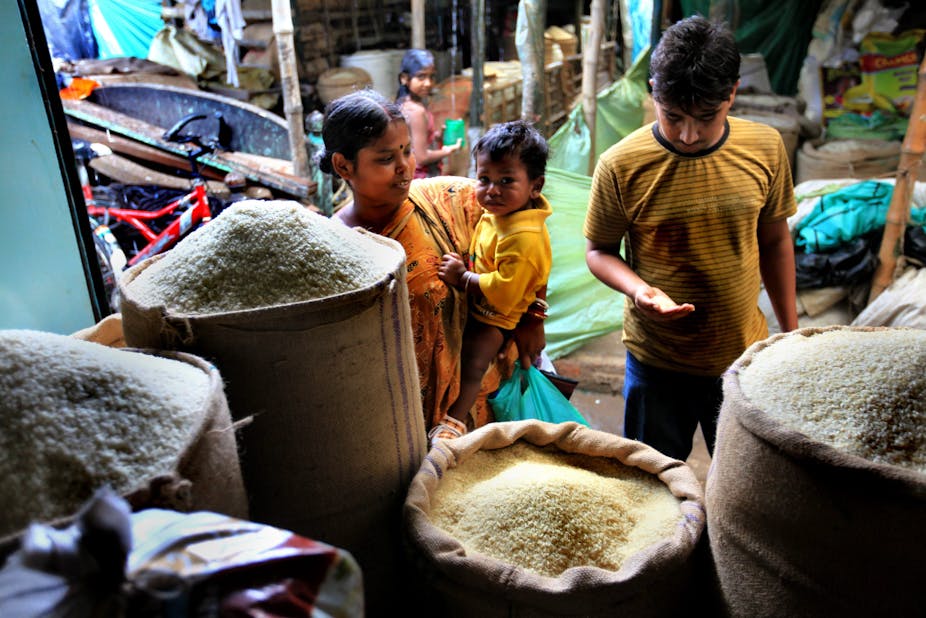Michael Gilbert’s article starts with a title that poses a question - Will patenting crops help feed the hungry? Fair enough, except he then proceeds to provide an answer, which as the posted comments below the article suggest, is incomprehensible.
Gilbert begins with an account of a variety of white rice developed by an organisation he runs. This rice, he says, contains much more iron and zinc than “conventional rice”, whatever that means.
Putting this qualitative issue to one side, what has patenting genes got to do with anything he says about this “new” rice?
First, Gilbert says this rice is “patented technology”, which begs a question about what the patentable part of it is since rice as such exists in nature.
Second, he refers to “very clever science” which his company used to “trick it into thinking” that it needs to absorb “a lot more iron from the soil than normal” (again, what is normal?).
The main problem with Gilbert’s answer to the question about feeding the hungry is that it digresses onto the subject of gene patents in the context of agriculture without any introduction.
Is the reader to assume that this “new” rice is the product of genetic manipulation? Is the genome of this rice patented? Is this rice really the answer to feeding the world’s poor and hungry?

You can be forgiven, if by the time you finish reading his article, you are unable to answer any of these questions.
Yes, patented crops will feed the hungry and if companies, such as Monsanto, had their way more and more patented crops would feed the world. But that’s only because, as is pointed out in the article: “gene patents are commonplace in agriculture”.
It’s not because there’s no other alternative. You see, feeding the world is one issue. How you feed the world is another. Unfortunately, Mr Gilbert confuses the two.
Patents are not the answer
For thousands of years humans have been able to feed themselves albeit not always successfully. Drought, war, civil unrest and, now, drastic and rapid climate change, are closely, or are being closely, associated with famine, population displacement and death.
History is littered with examples of humanity’s failure to provide adequate sustenance for all people at all times in all places.
But are gene patents the answer to this age old problem? Mr Gilbert would like us to believe that they are. I don’t agree.
Not to make too fine a point but since when is cutting and pasting genetic materials from one organism to another an inventive step when the materials themselves exist in nature in the first place?
What Mr Gilbert fails to explain is that gene patents are a legal aberration. The patent system is there to reward the act of invention and the dissemination of that act to the world through the publication of the patent.
The problem is that the rice Mr Gilbert refers to is just rice. Sure, it contains iron and zinc but then, what’s new about that?
And if people aren’t getting enough iron and zinc in their diets there are other grains such as amaranth, which contains 14 times the amount of iron, and wheat which contains 12 times the amount of zinc, than white rice.
So if people need more iron and zinc the solution isn’t just to eat Mr Gilbert’s rice but to eat a variety of grains.
Besides, the ability to provide essential minerals to humans through a variety of foods is important and, more to the point, it’s tasty.
Since when do we want to eat only one type of grain and expect it to provide all our daily vitamins and minerals? And since when is the development of such genetically modified foods able to solve the problem of world hunger anyway?
Loss of biodiversity
We already know through history that when a population relies on monoculture the risks of famine, population displacement and death are far greater.

Between 1845 and 1852 about one million people died from hunger in Ireland when a potato disease called potato blight affected a quarter of the potato harvest.
The implications of that tragedy on the entire world are well known. Yet, in forgetting the lessons from history agricultural research organisations are now working hand-in-glove with agri-biotech companies, like Monsanto, to ensure that patented plants and their products become the only source of the world’s food in the near future.
Mr Gilbert is right about one thing. Literally thousands of gene patents have been granted and are being applied for in regard to all forms of agriculture, not just plants.
What this means for the world has yet to be fully comprehended and I for one have grave doubts that those in the business of promoting gene patents really care if they feed the hungry.
You can read Michael Gilbert’s article – Will patenting crops help feed the hungry? here.

